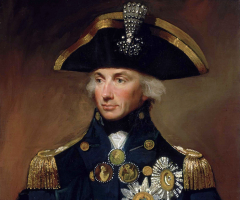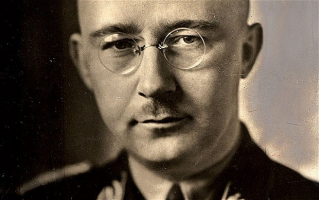Top 7 Interesting Facts about Nelson Mandela
Nelson Rolihlahla Mandela (July 18, 1918 - December 5, 2013) was a South African anti-apartheid activist who served as the country's first president from 1994 ... read more...to 1999. He was the country's first black president and the first elected in a completely democratic election. His administration was committed to eradicating apartheid's legacy through racial healing. He was the head of the African National Congress (ANC) party from 1991 to 1997 and was an ideological African nationalist and socialist. Here are the 7 interesting facts you should keep in mind.
-
One of the most interesting facts about Nelson Mandela is that he was the first black president of South Africa. Nelson Mandela's presidency began on May 10, 1994, when Nelson Mandela, an anti-apartheid activist, Umkhonto We Sizwe leader, lawyer, and former political prisoner, was inaugurated as President of South Africa and ended on June 14, 1999. He was the first non-White head of state in South African history, as well as the first to assume office after apartheid was abolished and complete multiracial democracy was established. Mandela was also the oldest head of state in South African history, having assumed office at the age of 75. His decision not to run for re-election in 1999 was influenced in part by his age.
On April 27, 1994, South Africa had its first multi-racial election with complete enfranchisement. The African National Congress received 63 percent of the vote in the election, and Mandela was inaugurated as the country's first Black President on May 10, 1994, with the National Party's F.W. de Klerk as his first deputy and Thabo Mbeki as his second in the Government of National Unity.
The president was limited to two consecutive five-year terms under the 1996 constitution. Mandela did not try to have the document altered to remove the two-term limit; in fact, he only expected to serve one term, with age playing a significant role in this choice. Mandela resigned from the presidency on June 14, 1999. Mbeki, who took over the presidency on June 16, succeeded him. Mandela departed from active politics and spent the next several years involved in a variety of humanitarian endeavors.
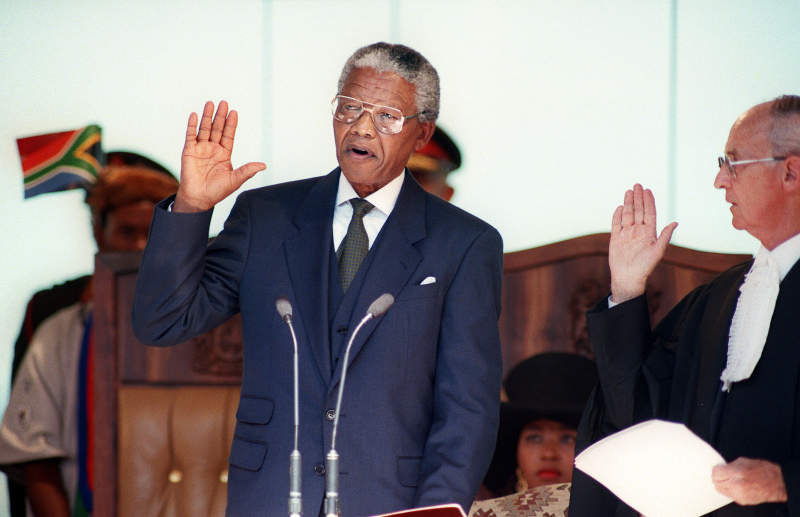
cbsnews.com 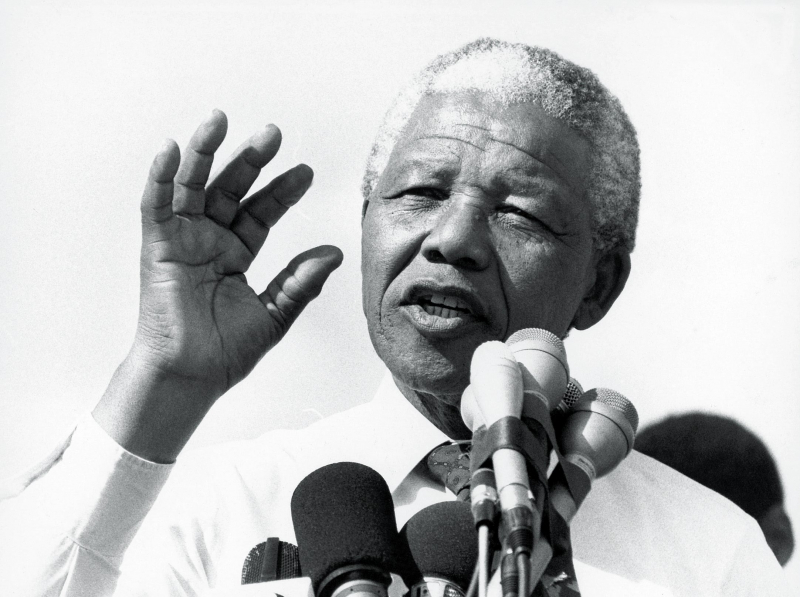
time.com -
Mandela saw national reconciliation as the most important mission of his presidency as he presided over the transition from apartheid minority rule to a multicultural democracy. After witnessing the devastation caused by the departure of white elites in other post-colonial African nations, Mandela attempted to reassure South Africa's white people that they were safe and well-represented in "the Rainbow Nation." Although the ANC would dominate his Government of National Unity, he attempted to build a broad coalition by nominating de Klerk as Deputy President and other National Party leaders as Ministers of Agriculture, Environment, and Minerals and Energy, as well as Buthelezi as Minister of Home Affairs. The remaining cabinet positions were filled by ANC members, many of whom had long been Mandela's comrades, such as Joe Modise, Alfred Nzo, Joe Slovo, Mac Maharaj, and Dullah Omar, while others, such as Tito Mboweni and Jeff Radebe, were much younger.
Mandela personally met with apartheid regime figures such as lawyer Percy Yutar and Hendrik Verwoerd's widow, Betsie Schoombie, and laid a wreath beside the statue of Afrikaner hero Daniel Theron. He declared that "courageous people do not fear forgiving, for the sake of peace," emphasizing personal forgiveness and reconciliation. As South Africa hosted the 1995 Rugby World Cup, he pushed black South Africans to rally behind the hitherto despised national rugby side, the Springboks. Mandela wore a Springbok shirt in the final versus New Zealand, and when the Springboks triumphed, Mandela delivered the trophy to Afrikaner captain Francois Pienaar. This was widely regarded as a significant step forward in the reconciliation of white and black South Africans. Mandela's efforts at peace assuaged white people's anxieties while also drawing criticism from more militant black people.
Mandela oversaw the establishment of a Truth and Reconciliation Commission, chaired by Tutu, to investigate crimes perpetrated by both the government and the ANC under apartheid. To avoid the creation of martyrs, the Commission gave individual amnesties in exchange for testimony about apartheid-era crimes. It was established in February 1996 and conducted two years of hearings on rapes, torture, bombings, and assassinations before presenting its final report in October 1998. Both de Klerk and Mbeki filed appeals to have portions of the report hidden, but only de Klerk's was successful. Mandela applauded the commission's work, saying it "had helped us move away from the past to concentrate on the present and the future".
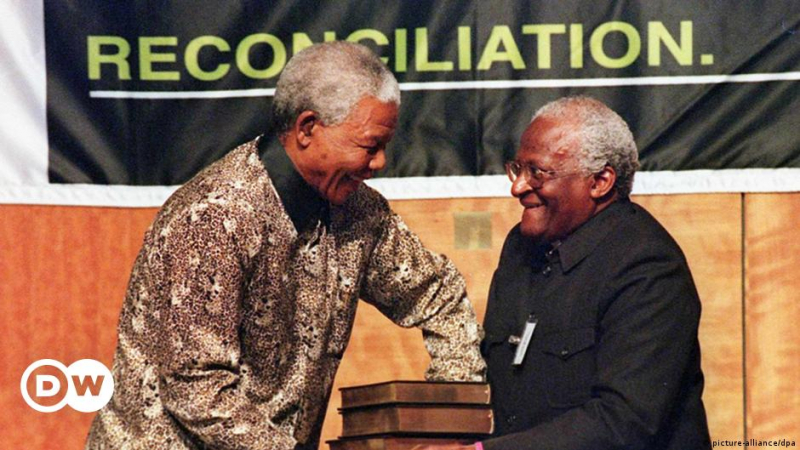
dw.com 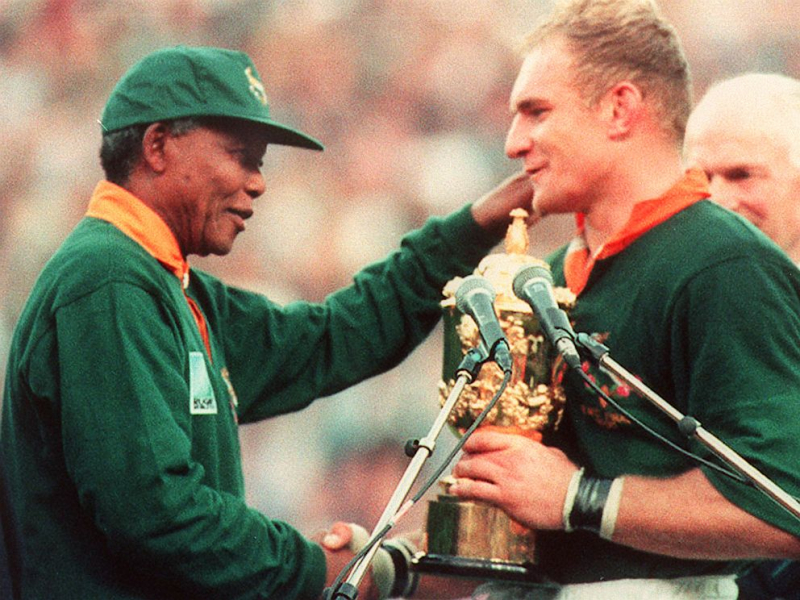
abcnews.go.com -
One of the most interesting facts about Nelson Mandela is that he became one of South Africa’s first black lawyers. Mandela began his law studies at the University of the Witwatersrand, where he was the sole black African student. He made friends with liberal and communist European, Jewish, and Indian students, including Joe Slovo and Ruth First. Mandela, who was becoming increasingly politicized, marched in August 1943 in support of a successful bus boycott to resist fare increases. When he joined the ANC, he was increasingly inspired by Sisulu, spending time with other activists, including his old buddy Oliver Tambo, at Sisulu's Orlando home.
Mandela met Anton Lembede, an ANC member aligned with the "Africanist" faction of African nationalism, which was vehemently opposed to a racially united front against colonialism and imperialism, as well as an alliance with the communists, in 1943. Despite friendships with non-blacks and communists, Mandela supported Lembede's beliefs, thinking that black Africans should be completely self-sufficient in their battle for political self-determination. Mandela was among a delegation that approached ANC president Alfred Bitini Xuma on the subject at his home in Sophiatown, deciding on the need for a youth wing to mass-mobilise Africans in opposition to their subjugation; the African National Congress Youth League (ANCYL) was founded on Easter Sunday 1944 in the Bantu Men's Social Centre, with Lembede as president and Mandela as a member of its executive committee.
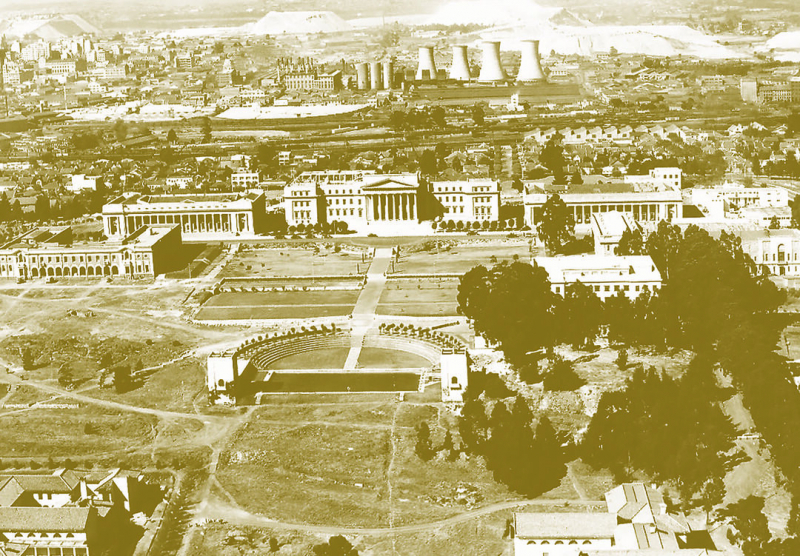
University of the Witwatersrand -Photo: issuu.com 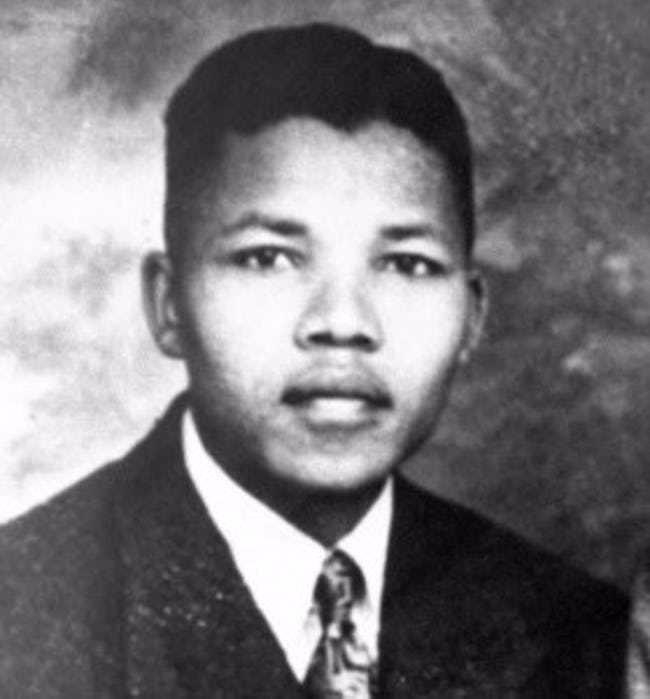
sutori.com -
One of the most interesting facts about Nelson Mandela is that he was elected national president of the ANCYL. Mandela replaced Xuma on the ANC national executive in March 1950, and the following year was elected national president of the ANCYL. The Defend Free Speech Convention was held in Johannesburg in March, bringing together African, Indian, and communist activists to advocate for a national strike on May Day in protest of apartheid and white minority rule. Mandela opposed the strike since it was multi-racial and not led by the ANC, but a majority of black workers participated, resulting in heightened police brutality and the passage of the Suppression of Communism Act, 1950, which impacted all protest groups' actions. He continued to argue against a racially united front at the ANC national congress in December 1951 but was defeated.
Following that, Mandela abandoned Lembede's Africanism in favor of a multi-racial front against apartheid. His suspicion of communism was broken down by friends like Moses Kotane and the Soviet Union's backing for national liberation battles, and he began reading books by Karl Marx, Vladimir Lenin, and Mao Zedong, eventually accepting the Marxist doctrine of dialectical materialism. Mandela started working at the H.M. Basner law company in April 1952, which was run by a communist, albeit his increasing devotion to work and activity meant he spent less time with his family
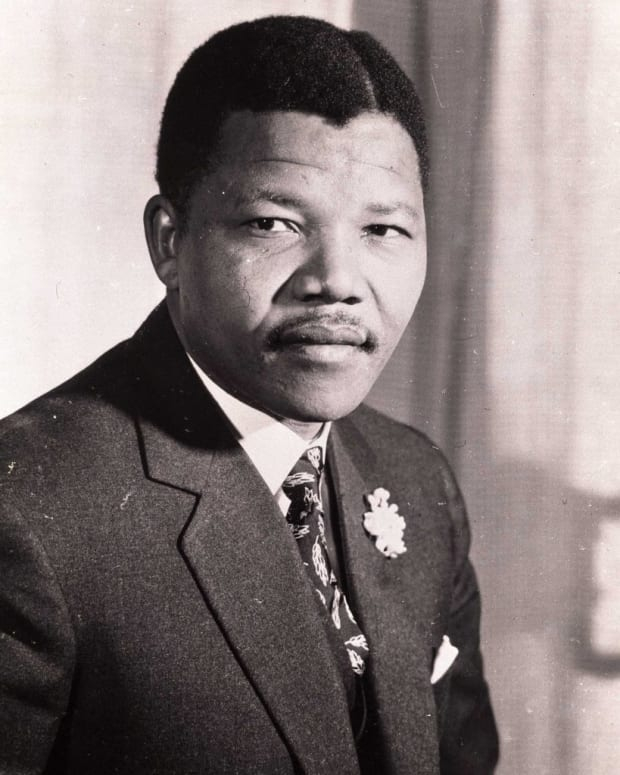
history.com 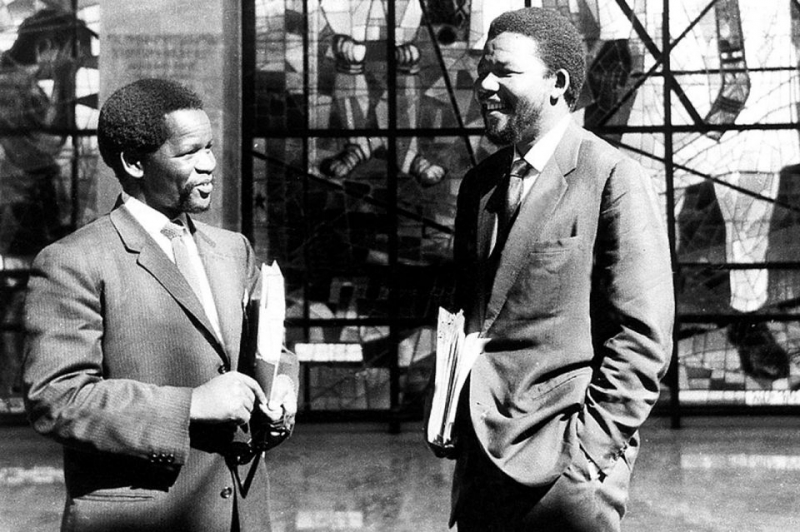
twitter.com -
It is a fact that Mandela was imprisoned from 1962 to 1990. On August 5, 1962, police captured Mandela and fellow campaigner Cecil Williams near Howick. Many MK members felt that the government had been tipped off about Mandela's movements, though Mandela himself dismissed these theories. In later years, Donald Rickard, a former American diplomat, disclosed that the CIA had alerted South African authorities of Mandela's location because it was concerned about his associations with communists. Mandela was imprisoned in Johannesburg's Marshall Square prison on charges of encouraging workers' strikes and leaving the country without authorization.
On July 11, 1963, police invaded Liliesleaf Farm, detaining individuals who were present and discovering documents documenting MK's actions, some of which included Mandela. The Rivonia Trial began in October in the Pretoria Supreme Court, with Mandela and his colleagues charged with four charges of sabotage and conspiracy to violently overthrow the government; Percy Yutar was their chief prosecutor. Despite the fact that four of the accused denied any affiliation with MK, Mandela and the other five accused admitted to sabotaging but denied ever agreeing to launch a guerrilla war against the government. They utilized the trial to emphasize their political cause; Mandela delivered his three-hour "I Am Prepared to Die" speech at the start of the defense's proceedings. Despite state censorship, that speech, which was inspired by Castro's "History Will Absolve Me," was extensively publicized in the press.
The trial drew international attention; there were global appeals for the accused's release from the United Nations and World Peace Council, and Mandela was elected president of the University of London Union. On June 12, 1964, Justice De Wet convicted Mandela and two of his co-accused guilty of all four crimes; despite the prosecution's request for the death penalty, the court sentenced them to life in prison.
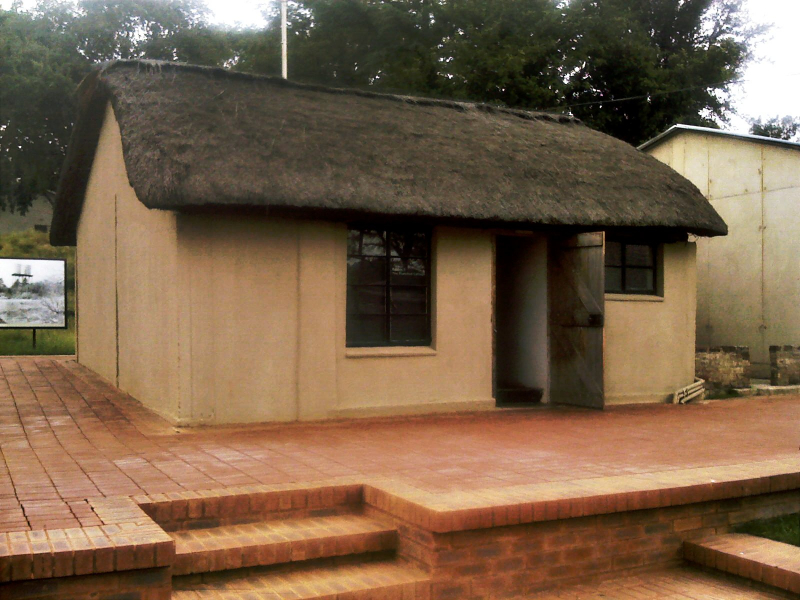
Liliesleaf Farm -Photo: wikiwand.com 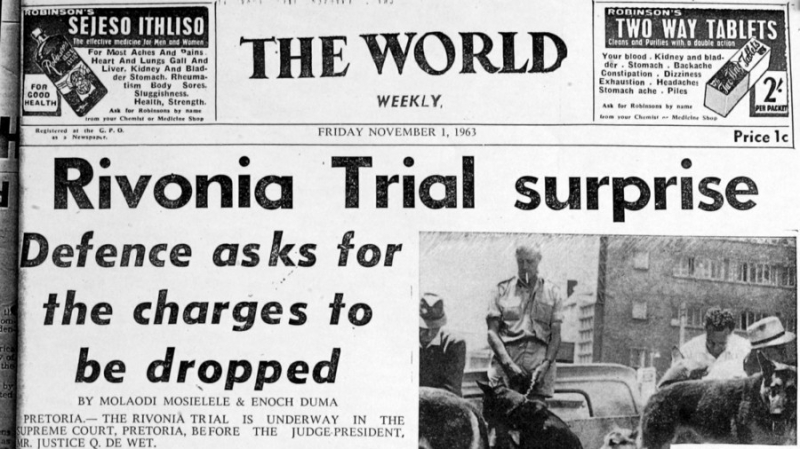
The Rivonia Trial -Photo: rt.com -
Mandela received over 250 awards, accolades, prizes, honorary degrees, and citizenship during his lifetime in recognition of his political achievements. Among his honors were the Nobel Peace Prize, the Presidential Medal of Freedom, the Lenin Peace Prize of the Soviet Union, and the Libyan Al-Gaddafi International Prize for Human Rights. In 1990, India bestowed upon him the Bharat Ratna, and in 1992, Pakistan bestowed upon him the Nishan-e-Pakistan. The same year, Turkey presented him with the Atatürk Peace Award; he initially refused the award, citing human rights violations committed by Turkey at the time, but later accepted it in 1999. He was made an honorary Canadian citizen and was appointed to the Order of Isabella the Catholic and the Order of Canada. Queen Elizabeth II made him a Bailiff Grand Cross of the Order of St. John and inducted him into the Order of Merit.
Johannesburg granted Mandela the Freedom of the City in 2004, and a Mandela statue was unveiled in 2008 near where he was released from prison. On Mandela's birthday in 2013, a bronze statue of him was unveiled at Pretoria's Union Buildings. The United Nations General Assembly declared Mandela's birthday, 18 July, as "Mandela Day" in November 2009, in recognition of his contributions to the anti-apartheid struggle. It encouraged people to devote 67 minutes to doing something good for others in honor of Mandela's 67-year involvement with the movement. To honor Mandela's legacy, the UN General Assembly renamed the revised Standard Minimum Rules for the Treatment of Prisoners "the Mandela Rules" in 2015.
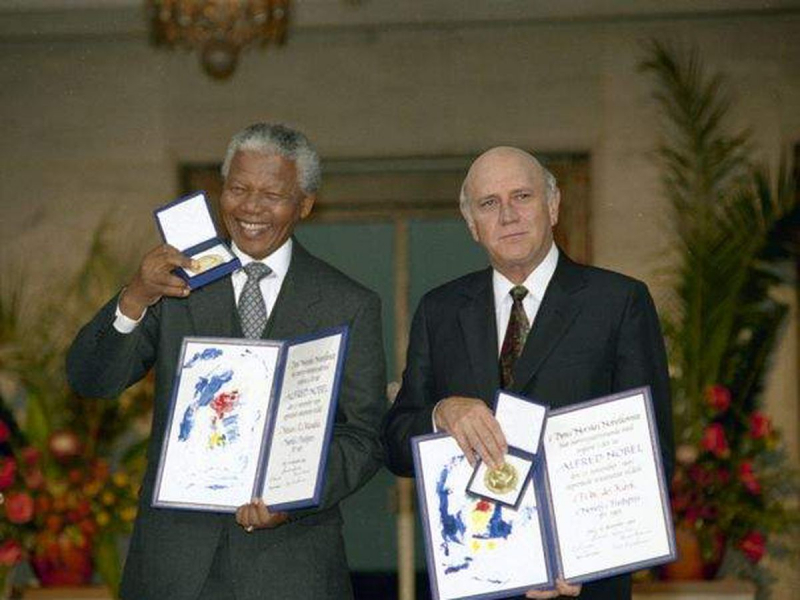
tampabay.com 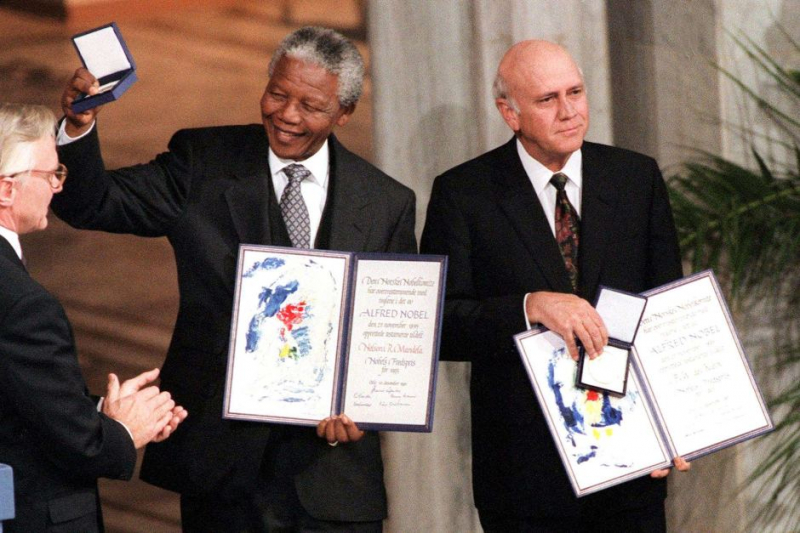
gorodvo.ru -
Mandela was widely regarded as both the father of the nation and the founding father of democracy in South Africa at the time of his death. Outside of South Africa, he was a "global icon," according to South African studies scholar Rita Barnard, who called him "one of the most revered figures of our time." According to one biographer, he was a modern democratic hero. He is frequently cited as one of the twentieth century's exemplary anti-racist and anti-colonial leaders, alongside Mahatma Gandhi and Martin Luther King Jr.
Mandela rose to international prominence during his imprisonment in the 1980s when he became the world's most famous political prisoner, a symbol of the anti-apartheid movement, and an inspiration to millions who embraced the ideal of human equality.
Mandela's biographer described him in 1986 as "the embodiment of the struggle for liberation" in South Africa. Meredith claimed that by becoming "a potent symbol of resistance" to apartheid in the 1980s, he had achieved mythical status around the world. Even during Mandela's lifetime, this myth had become "so powerful that it blurs the realities," transforming Mandela into a "secular saint," according to Sampson. Within a decade of his presidency ending, Mandela's era was widely regarded as a golden age of hope and harmony, with much nostalgia expressed for it. Those who criticized his successors, such as Mbeki and Zuma, frequently invoked his name. Mandela gained international acclaim for his activism in overcoming apartheid and fostering racial reconciliation, and he came to be regarded as a moral authority with a strong concern for truth.
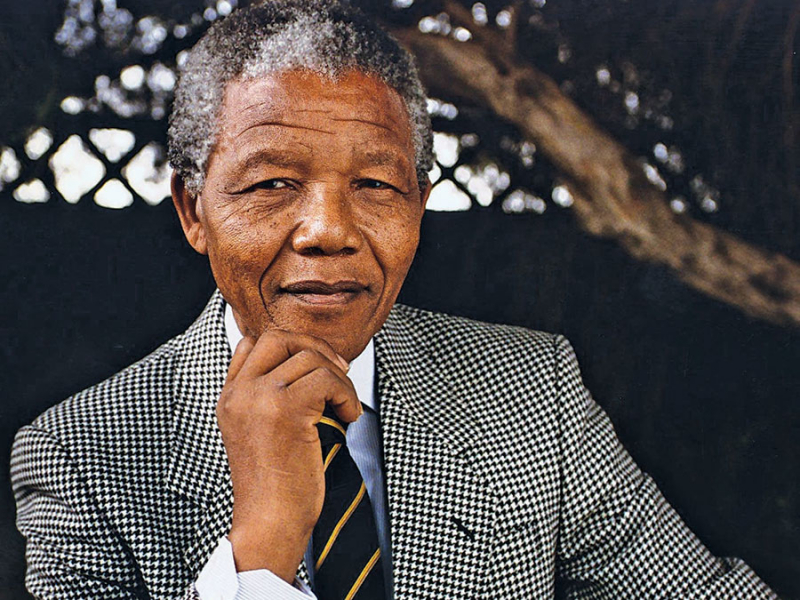
kandifoinstitute.org 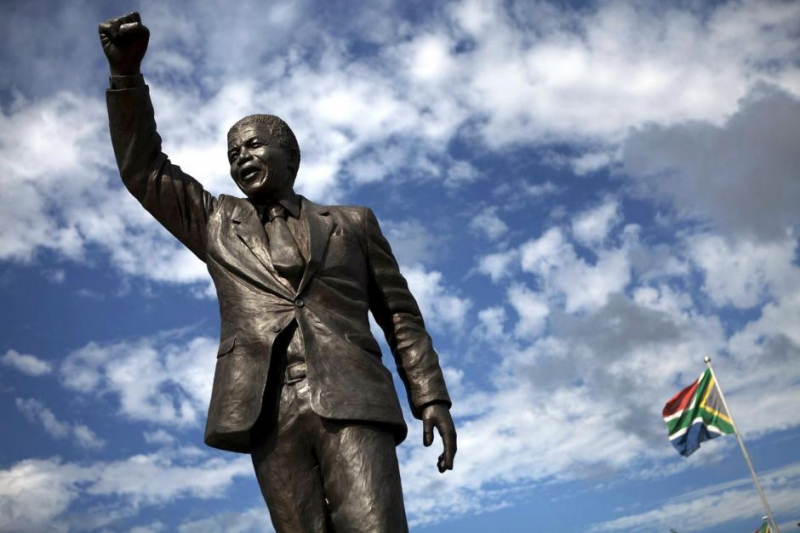
kentakepage.com









